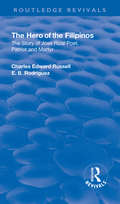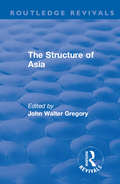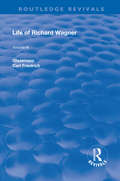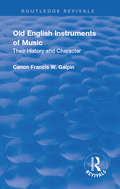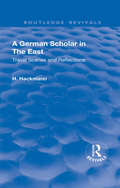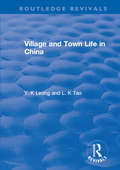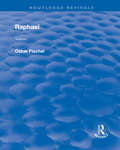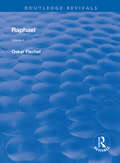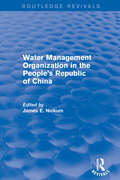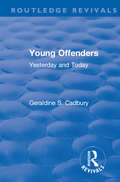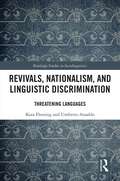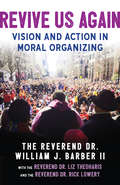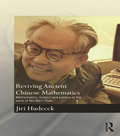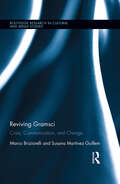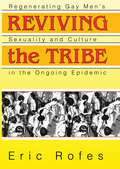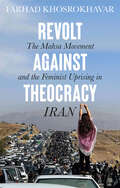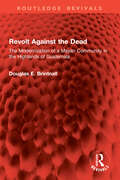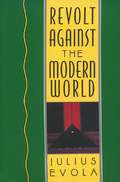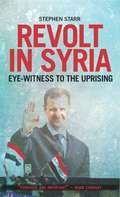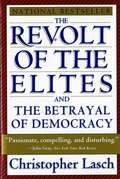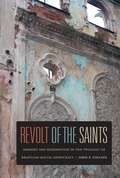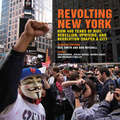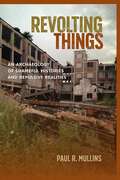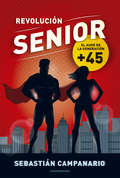- Table View
- List View
Revival: The Story of Jose Rizal: Poet, Patriot and Martyr (Routledge Revivals)
by Charles Edward Russell E. B. RodriguezThis book is about José Protasio Rizal Mercado y Alonso Realonda, widely known as José Rizal (June 19, 1861 – December 30, 1896). He was a Filipino nationalist and polymath during the tail end of the Spanish colonial period of the Philippines. An ophthalmologist by profession, Rizal became a writer and a key member of the Filipino Propaganda Movement which advocated political reforms for the colony under Spain. He was executed by the Spanish colonial government for the crime of rebellion after an anti-dd revolution, inspired in part by his writings, broke out. Though he was not actively involved in its planning or conduct, he ultimately approved of its goals which eventually led to Philippine independence.
Revival: The Structure Of Asia (1976) (Routledge Revivals)
by John Walter GregoryAt this time of narrow specialization in science, it seems almost impossible to fully grasp the personality of John Walter Gregory and his impact on the evolution of geological concepts. He belonged to the generation of unusual men who by their endeavors in different technical fields made the British Emprire into a domain where the sun never set. <P><P>Gregory was a brilliant thinker endowed with the rare combination of an incredible memory for facts and a capacity for synthesis, and, as his explorations extended across all continents, he thus became an authority on the world as a whole. Nonetheless, he remained modest, sincere, and simple and always friendly toward his peers and his students. There are few scientific fields to which he did not contribute. In our present world of computer language he would be characterized by the key-words of geology, georgraphy, engineering, and sociology, a combination of disciplines which today appear unthinkable. In his time he was a scholar, a teacher, an adventurer, and a man of letters as well.
Revival: The Theatre (Routledge Revivals)
by Carl Francis GlasenappThird volume of Carl Francis Glasenapp's Life of Richard Wagner.
Revival: Their History and Character (Routledge Revivals)
by Francis W. GalphinThe study of musical instruments now no longer with us is necessary, not only for the musician and composer, but for the man of letters, the artist, and the chronicler of our national life; for many allusions to customs of bygone times cannot otherwise be understood, and we should be spared such a trying ordeal as we were recently subjected to by one of our leading illustrated papers, which introduced into a thirteenth century scene a twentieth century mandoline with an up to date mechanism.
Revival: Travel Scenes and Reflections (Routledge Revivals)
by Heinrich HackmannIn 1910., Dr Hackmann started on a lengthy tour throughout Mongolia, China, Japan, Cambodia, Siam, and India, studying Buddhism and other Eastern Religions, Shintoism and Taoism. He returned to London in the spring of 1911, and published this book.
Revival: Village and Town Life in China (Routledge Revivals)
by Y. K Leong L. K TaoMany books have been written about China by Europeans. The present volume is a book about China by two Chinese. They are moreover, Chinese who have had considerable opportunities of studying other forms of civilization than their own, having lived in England as students for some Years. The point of view is not always that of the English reader, but, that view of Europeans who write on China is not that of Chinese, and for that full understanding of a great Empire, politically and commercially, is becoming year by year a matter of greater importance to the West, the Chinese point of view is therefore, essential. The book falls into two parts. Mr. Leong describes village life, the family, the clan and the village society. Mr. Tai deals more particularly with town administration and social life, with the popular side of Chinese Buddhism.
Revival: Volume 1 (Routledge Revivals)
by Oskar FischelBeginning with a dissertation on Raphael’s drawings, Oskar Fischel made it his endeavor, with an ever growing knowledge of Raphael, to arrive at a comprehensive representation, and this he has left behind this book. The illustrations gathered together by him over a period of many years are intended, in the selection here provided, to induce the reader to seek out the works of the artist. The book speaks of Raphael’s influential manner on society.
Revival: Volume 2 (Routledge Revivals)
by Oskar FichelThe famous Italian artist Raphael's illustrations, drawings and portraits, shown in this book of plates by Oskar Fichnel.
Revival: Water Management Organization in the People's Republic of China (Routledge Revivals)
by James E. NickumCombining a journalist's view of major trials with a political-legal analysis, this text gives a picture of the politics of justice in Russia. Coverage of major court cases ranges from the 1961 trial of the "currency speculators" to the Communist Party trial of 1992.
Revival: Yesterday and Today (Routledge Revivals)
by Geraldine S. CadburyThis unusual book tells vividly the story of children who have broken the law and their treatment from the time of King Athelstan to present day. With few exceptions, they suffered for centuries the same harsh treatment as older men and women, and it was only gradually that the terrible conditions in the prisons in this and other countries improved The early experiments in wiser treatment are graphically described and the efficacy of modern reformative measures is clearly demonstrated Legislation affecting young offenders is explained and the book should prove most valuable to all those who have responsibility for dealing with difficult children
Revivals, Nationalism, and Linguistic Discrimination: Threatening Languages (Routledge Studies in Sociolinguistics)
by Umberto Ansaldo Kara FlemingIs linguistic revival beneficiary to the plight of newly emerging, peripheral or even ‘threatened’ cultures? Or is it a smokescreen that hides the vestiges of ethnocentric ideologies, which ultimately create a hegemonic relationship? This book takes a critical look at revival exercises of special historical and geopolitical significance, and argues that a critical and cautious approach to revival movements is necessary. The cases of Sinhala, Kazakh, Mongolian, Catalan, and even Hong Kong Cantonese show that it is not through linguistic revival, but rather through political representation and economic development, that the peoples in question achieve competitiveness and equality amongst their neighbors. On the other hand, linguistic revival in these and other contexts can, and has been, used to support nationalist or ethnocentric agendas, to the detriment of other groups, recreating the same dynamics that generated the argument for revival in the first place. This book argues that respect for linguistic and other diversity, multilingualism and multiculturalism, is not compatible with linguistic revival that mirrors nation-building and essentializing identity construction.
Revive Us Again: Vision and Action in Moral Organizing
by Rev William J. Barber II Rev Rick Lowery Rev Liz TheoharisA collection of sermons and speeches that lay out a groundbreaking vision for intersectional organizing, paired with inspirational and practical essays from activists in today's Poor People's CampaignThe Rev. Dr. William J. Barber II has been called "the closest person we have to Martin Luther King Jr. in our midst" (Cornel West) and "one of the most gifted organizers and orators in the country today" (Ari Berman). In this age of political division and civic unrest, Rev. Barber's message is more necessary than ever. This volume features Rev. Barber's most stirring sermons and speeches, with response essays by prominent public intellectuals, activists, and faith leaders. Drawing from the history of social movements in the US, especially the Rev. Dr. Martin Luther King Jr.'s Poor People's Campaign, Rev. Barber and the contributors to this volume speak to the most pressing issues of our time, including Black Lives Matter, the fight for a $15 minimum wage, the struggle to protect voting rights, the march for women's rights, and the movement to overcome poverty and unite the dispossessed across all dividing lines. Grounded in the fundamental biblical theme of poor and oppressed people taking action together, the book suggests ways to effectively build a fusion movement to make America fair and just for everyone.
Reviving Aleppo: Urban, Legal and Digital Approaches for Post-War Recovery (Cities, Heritage and Transformation)
by Fabian Thiel Rahaf OrabiThis book provides indispensable and interdisciplinary insights into the revitalization and redevelopment of urban centers in war-stricken conflict regions, such as Aleppo in northern Syria. This contribution explores innovative, cutting-edge toolkits for academicians, digital building technologists, engineers, architects, archeologists, (urban) planners, land policy advisors and legal scholars. The compendium not only analyzes strategies and shortcomings of implementation guidelines drawn by donor organizations, development agencies and political actors, but also explores possibilities for initiating functioning and sustainably resilient networks that can establish capacity-building platforms for recovery and reconstruction. Although the work focuses on a city in Syria, it holds lessons, toolkits and instruments for other areas in the region and beyond.
Reviving Ancient Chinese Mathematics: Mathematics, History and Politics in the Work of Wu Wen-Tsun (Needham Research Institute Series)
by Jiri HudecekTwentieth-century China has been caught between a desire to increase its wealth and power in line with other advanced nations, which, by implication, means copying their institutions, practices and values, whilst simultaneously seeking to preserve China’s independence and historically formed identity. Over time, Chinese philosophers, writers, artists and politicians have all sought to reconcile these goals and this book shows how this search for a Chinese way penetrated even the most central, least contested area of modernity: science. Reviving Ancient Chinese Mathematics is a study of the life of one of modern China’s most admired scientific figures, the mathematician Wu Wen-Tsun. Negotiating the conflict between progress and tradition, he found a path that not only ensured his political and personal survival, but which also brought him renown as a mathematician of international status who claimed that he stood outside the dominant western tradition of mathematics. Wu Wen-Tsun’s story highlights crucial developments and contradictions in twentieth -century China, the significance of which extends far beyond the field of mathematics. On one hand lies the appeal of radical scientific modernity, "mechanisation" in all its forms, and competitiveness within the international scientific community. On the other is an anxiety to preserve national traditions and make them part of the modernisation project. Moreover, Wu’s intellectual development also reflects the complex relationship between science and Maoist ideology, because his turn to history was powered by his internalisation of certain aspects of Maoist ideology, including its utilitarian philosophy of science. This book traces how Wu managed to combine political success and international scientific eminence, a story that has wider implications for a new century of increasing Chinese activity in the sciences. As such, it will be of great interest to students and scholars of Chinese history, the history of science and the history and philosophy of mathematics.
Reviving Gramsci: Crisis, Communication, and Change (Routledge Research in Cultural and Media Studies)
by Marco Briziarelli Susana Martínez GuillemEngaging debates within cultural studies, media and communication studies, and critical theory, this book addresses whether Gramscian thought continues to be relevant for social and cultural analysis, in particular when examining times of crisis and social change. The book is motivated by two intertwined but distinct purposes: first, to show the privileged and fruitful link between a "Gramscian Theory of Communication" and a "Communicative Theory of Gramsci;" second, to explore the ways in which such a Gramscian perspective can help us interpret and explain different forms of political activism in the twenty-first century, such as "Occupy" in the US, "Indignados" in Spain, or "Movimento Cinque Stelle" in Italy.
Reviving the Tribe: Regenerating Gay Men's Sexuality and Culture in the Ongoing Epidemic
by Eric RofesReviving the Tribe creates a rich and brutally honest portrait of contemporary gay men’s lives amidst the seemingly endless AIDS epidemic and offers both autobiographical self-examination and a relentless critique of current sexual politics within the gay community. Fearlessly confronting the horrors experiences by surviving gay men without giving way to hopelessness, denial, or blame, Reviving the Tribe offers an inspiring blueprint for the gay community which faces a continuing spiral of disaster.In Reviving the Tribe, Author Eric Rofes argues that a return to the interrupted agenda of gay liberation may provide long-term motivation to keep gay men alive and spur rejuvenation of new generations of gay culture. By interweaving social history, psychology, anthropology, epidemiology, sociology, feminist theory, and sexology with his own journey through the epidemic, Rofes provides a moving and compelling argument for stepping out of the “state of emergency” and embracing a life beyond disease. He boldly offers a plan for community regeneration focused on restoring mental health, reclaiming sexuality, and mending the social fabric of communal gay life. Rofes asks unspoken questions lurking in gay men&’s minds and suggests answers to these questions, hitting such controversial topics as: gay men&’s sex cultures of the 1970s why “educated” gay men continue to become HIV-infected changing forms of gay masculinity the opening of new sex clubs and bathhouses leaving “rage activism” behind links between the Holocaust and AIDS unacknowledged roots in the feminist movement of gay men’s AIDS response mass denial of chronic trauma among gay menThe refusal to confront the ever-intensifying manifestations of AIDS has seriously endangered the foundation of contemporary gay communities. Rofes argues that many gay men suffer from the ”disaster syndrome,” a psychologically determined response that defends individuals against being overwhelmed by traumatic experience. In Reviving the Tribe, he provides a radical critique of contemporary gay political culture and suggests alternatives which offer the opportunity to face history, grapple with decimation, and regenerate communal life.Cautioning that an honest analysis of recent gay history and urban cultures promises neither to stop gay men’s suffering nor to end continuing HIV infections, Reviving the Tribe provides gay men with a clear lens through which they might scrutinize their lives, come to a new understanding of the epidemic’s impact on their generation, and redirect activism. This courageous and inspiring work brings Rofes’commanding intellect and twenty years of grassroots gay activism to bear on the challenging task of reconstructing gay life in the new mellennium. Reviving the Tribe is filled with insight of special interest to gay men, lesbians involved in the mixed lesbian/gay movement, sociologists, public health workers, psychologists, counselors, sex educators, religious leaders, and AIDS prevention policymakers searching for fresh vision.
Revolt Against Theocracy: The Mahsa Movement and the Feminist Uprising in Iran
by Farhad KhosrokhavarThis book is the first in-depth account of the uprising in Iran that began on 16 September 2022, when a young woman, Mahsa Amini, was killed by the morality police. In the months that followed, protests and demonstrations erupted across Iran, representing the most serious challenge to the Iranian regime in decades. Women have played a key role in these protests, refusing to wear a hijab and cutting their hair in public to chants of ‘Woman, Life, Freedom’. In Farhad Khosrokhavar’s account, these protests represent the first truly feminist movement in Iran, and one of the first in the Muslim world, where women have been in the vanguard. There have been many movements in the Muslim world in which women have taken part, but rarely have women – and especially young women – been the driving force. The Mahsa Movement also championed non-Islamic, secularized values, based on the joy of living, the assertion of bodily freedom and the quest for gender equality and democracy. Khosrokhavar gives a full account of the context of and background to the events triggered by the killing of Mahsa Amini, analyzes the character of the Mahsa Movement and the regime’s repressive response to it, and draws out its broader significance as one of the most significant feminist movements and political uprisings in the Islamic world.
Revolt Against the Dead: The Modernization of a Mayan Community in the Highlands of Guatemala (Routledge Revivals)
by Douglas E. BrintnallFirst published in 1979, Revolt Against the Dead describes the changing lifestyle of the Aguacatec Indians, a Mayan peasant people of the northwestern highlands of Guatemala. The author presents the societal transformation from an economic, social, political, and religious perspective.The book explores both internal and external factors responsible for bringing about the change in the Aguacatan community. It emphasizes the interplay between changing local conditions and outside influences. As many factors that occurred at different times were responsible for the transformation, most of the book is organized into a kind of history. The local events are therefore presented as three major epochs—traditional Aguacatan; a transitional period of collapse; and the contemporary, new order. This volume will be of interest to students and researchers of anthropology and history.
Revolt Against the Modern World: Politics, Religion, and Social Order in the Kali Yuga
by Julius EvolaWith unflinching gaze and uncompromising intensity Julius Evola analyzes the spiritual and cultural malaise at the heart of Western civilization and all that passes for progress in the modern world. As a gadfly, Evola spares no one and nothing in his survey of what we have lost and where we are headed. At turns prophetic and provocative, Revolt against the Modern World outlines a profound metaphysics of history and demonstrates how and why we have lost contact with the transcendent dimension of being. The revolt advocated by Evola does not resemble the familiar protests of either liberals or conservatives. His criticisms are not limited to exposing the mindless nature of consumerism, the march of progress, the rise of technocracy, or the dominance of unalloyed individualism, although these and other subjects come under his scrutiny. Rather, he attempts to trace in space and time the remote causes and processes that have exercised corrosive influence on what he considers to be the higher values, ideals, beliefs, and codes of conduct--the world of Tradition--that are at the foundation of Western civilization and described in the myths and sacred literature of the Indo‑Europeans. Agreeing with the Hindu philosophers that history is the movement of huge cycles and that we are now in the Kali Yuga, the age of dissolution and decadence, Evola finds revolt to be the only logical response for those who oppose the materialism and ritualized meaninglessness of life in the twentieth century. Through a sweeping study of the structures, myths, beliefs, and spiritual traditions of the major Western civilizations, the author compares the characteristics of the modern world with those of traditional societies. The domains explored include politics, law, the rise and fall of empires, the history of the Church, the doctrine of the two natures, life and death, social institutions and the caste system, the limits of racial theories, capitalism and communism, relations between the sexes, and the meaning of warriorhood. At every turn Evola challenges the reader’s most cherished assumptions about fundamental aspects of modern life. A controversial scholar, philosopher, and social thinker, JULIUS EVOLA (1898-1974) has only recently become known to more than a handful of English‑speaking readers. An authority on the world’s esoteric traditions, Evola wrote extensively on ancient civilizations and the world of Tradition in both East and West. Other books by Evola published by Inner Traditions include Eros and the Mysteries of Love, The Yoga of Power, The Hermetic Tradition, and The Doctrine of Awakening.
Revolt in Syria: Eye-witness to the Uprising
by Stephen StarrIn Revolt, Stephen Starr delves deep into the lives of those affected by the Syrian state over the past five decades. Interviewing people from all levels of society, Starr gathers and interprets the views and beliefs that illustrate why Syria, with its numerous sects and religious diversity, has been so prone to violence and civil instability.
Revolt of the Elites and the Betrayal of Democracy
by Christopher LaschIn a front-page review in the Washington Post Book World, John Judis wrote: "Political analysts have been poring over exit polls and precinct-level votes to gauge the meaning of last November's election, but they would probably better employ their time reading the late Christopher Lasch's book."
Revolt of the Saints: Memory and Redemption in the Twilight of Brazilian Racial Democracy
by John F. CollinsIn 1985 the Pelourinho neighborhood in Salvador, Brazil was designated as a UNESCO World Heritage Site. Over the next decades, over 4,000 residents who failed to meet the state's definition of "proper Afro-Brazilianness" were expelled to make way for hotels, boutiques, NGOs, and other attractions. In Revolt of the Saints, John F. Collins explores the contested removal of the inhabitants of Brazil's first capital and best-known site for Afro-Brazilian history, arguing that the neighborhood's most recent reconstruction, begun in 1992 and supposedly intended to celebrate the Pelourinho's working-class citizens and their culture, revolves around gendered and racialized forms of making Brazil modern. He situates this focus on national origins and the commodification of residents' most intimate practices within a longer history of government and elite attempts to "improve" the citizenry's racial stock even as these efforts take new form today. In this novel analysis of the overlaps of race, space, and history, Collins thus draws on state-citizen negotiations of everyday life to detail how residents' responses to the attempt to market Afro-Brazilian culture and reimagine the nation's foundations both illuminate and contribute to recent shifts in Brazil's racial politics.
Revolting New York: How 400 Years of Riot, Rebellion, Uprising, and Revolution Shaped a City (Geographies of Justice and Social Transformation #38)
by Neil Smith and Don MitchellA comprehensive guide to New York City&’s historical geography of social and political movements. Occupy Wall Street did not come from nowhere. It was part of a long history of uprising that has shaped New York City. From the earliest European colonization to the present, New Yorkers have been revolting. Hard hitting, revealing, and insightful, Revolting New York tells the story of New York&’s evolution through revolution, a story of near-continuous popular (and sometimes not-so-popular) uprising. Richly illustrated with more than ninety historical and contemporary images, historical maps, and maps drawn especially for the book, Revolting New York provides the first comprehensive account of the historical geography of revolt in New York, from the earliest uprisings of the Munsee against the Dutch occupation of Manhattan in the seventeenth century to the Black Lives Matter movement and the unrest of the Trump era. Through this rich narrative, editors Neil Smith and Don Mitchell reveal a continuous, if varied and punctuated, history of rebellion in New York that is as vital as the more standard histories of formal politics, planning, economic growth, and restructuring that largely define our consciousness of New York&’s story.Contributors: Marnie Brady, Kathleen Dunn, Zultán Gluck, Rachel Goffe, Harmony Goldberg, Amanda Huron, Malav Kanuga, Esteban Kelly, Manissa McCleave Maharawal, Don Mitchell, Justin Sean Myers, Brendan P. O&’Malley, Raymond Pettit, Miguelina Rodriguez, Jenjoy Roybal, McNair Scott, Erin Siodmak, Neil Smith, Peter Waldman, and Nicole Watson.&“The writing is first-rate, with ample illustrations and many contemporary and historical images. Fast paced and fascinating, like the city it profiles.&”—Library Journal
Revolting Things: An Archaeology of Shameful Histories and Repulsive Realities
by Paul R. MullinsIn this book, Paul Mullins examines a wide variety of material objects and landscapes that induce anxiety, provoke unpleasantness, or simply revolt us. Bringing archaeological insight to subjects that are not usually associated with the discipline, he looks at the way the material world shapes how we imagine, express, and negotiate difficult historical experiences.Revolting Things delves into well-known examples of “dark heritage” ranging from Confederate monuments to the sites of racist violence. Mullins discusses the burials and gravesites of figures who committed abhorrent acts, locations that in many cases have been either effaced or dynamically politicized. The book also considers racial displacement in the wake of post–World War II urban renewal, as well as the uneasiness many contemporary Americans feel about the social and material sameness of suburbia.Mullins shows that these places and things are often repressed in public memory and discourse because they reflect entrenched structural inequalities and injustices we are reluctant to acknowledge. Yet he argues that the richest conversations about the uncomfortable aspects of the past happen because these histories have tangible remains, exerting a persistent hold on our imagination. Mullins not only demonstrates the emotional power of material things but also exposes how these negative feelings reflect deep-seated anxieties about twenty-first-century society.
Revolución senior: El auge de la generación + 45
by Sebastián CampanarioSebastián Campanario cuenta de qué modo los +45 tendrán un lugar protagónico en los próximos años. Una propuesta original y disruptiva, que da las claves para deconstruir nuestros prejuicios etarios y entender los huracanes de cambio que estamos atravesando. ¿Solo los jóvenes son creativos e innovadores? ¿Qué podrían hacer las empresas y los gobiernos para dejar de ver los años como un problema y aprovechar su potencial económico? ¿A qué edad, realmente, uno considera que los demás son viejos? Así como sucedió con el debate de género, crece la conciencia sobre el estigma de valores negativos atribuidos a la vida adulta. El advenimiento de los primeros millennials cincuentones no está lejos, así que las economías se están replanteando su relación con los mayores de esa edad. Sebastián Campanario cuenta de qué modo los +45 tendrán un lugar protagónico en los próximos años, y da las claves para deconstruir nuestros prejuicios etarios y entender los huracanes de cambio que estamos atravesando. Mitos, estadísticas y testimonios en torno a la generación senior en la era de la inteligencia adaptativa. Paso a paso, cómo será "el contraataque de los clásicos", en uno de los libros más disruptivos y originales.
